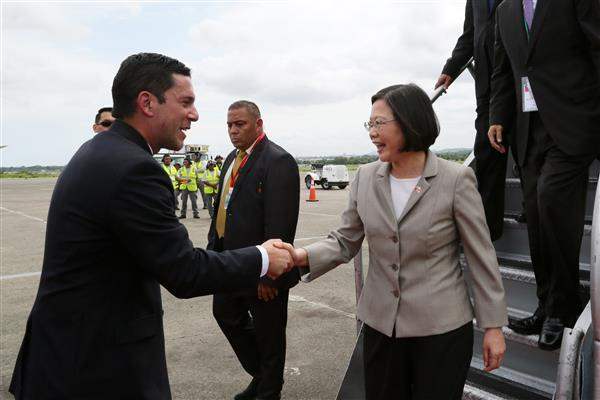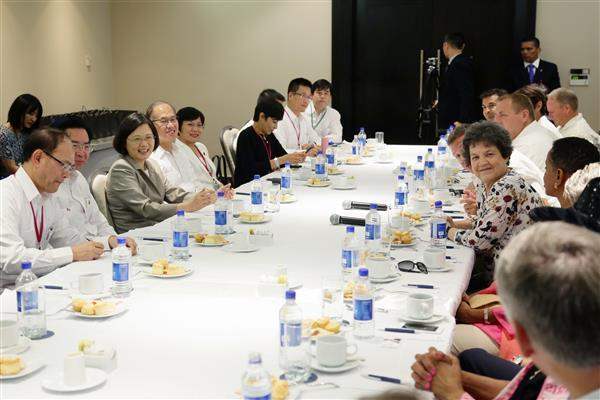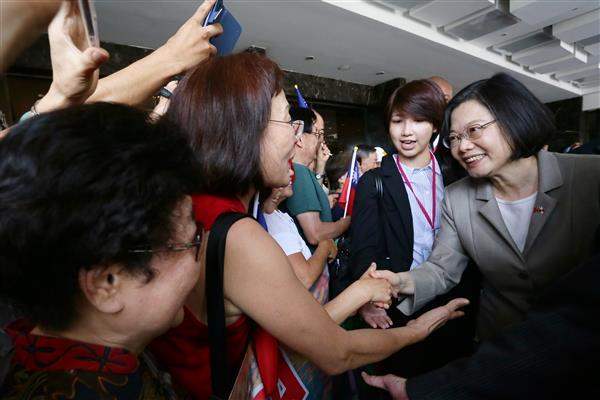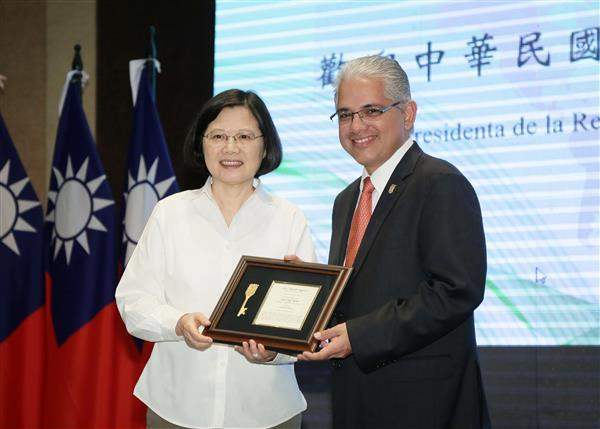News & activities
 News releases
News releases
After a flight of roughly three hours, President Tsai Ing-wen and her delegation arrived at Panama's Tocumen International Airport at 2:30 p.m. local time on Saturday, June 25 (3:30 a.m., June 26, Taipei time).
After President Tsai's chartered aircraft came to a halt on the tarmac, ROC Ambassador to Panama Jose Maria Liu (劉德立) and Director General of Protocol Roberto Zuniga of the Ministry of Foreign Affairs of Panama boarded the plane to welcome her. Panama's Vice-Minister of Foreign Affairs Luis Miguel Hincapie welcomed President Tsai at the foot of the airstair, and then accompanied her in accepting a red-carpet military honor guard salute.
President Tsai said she was honored to lead a delegation to attend the inauguration ceremony for the Panama Canal Expansion at the invitation of Panama's President Juan Carlos Varela Rodriguez. Noting that the Panama Canal is one of the world's great transportation arteries, President Tsai stated that to be taking part in such a momentous event together with heads of state, representatives from other countries, and the government and people of Panama felt a lot like traveling a long distance to attend a good friend's happy occasion, with hearts full of anticipation and happiness.
President Tsai also pointed out that besides taking part in the inauguration ceremony for the Panama Canal Expansion, she will also exchange views with President Varela on the enhancement of Taiwan-Panama relations and other issues of shared interest. Hopefully, she said, direct interactions will enable the two sides to continue strengthening bilateral ties and promoting the well-being of the people of both countries.
President Tsai emphasized that official diplomatic ties between the Republic of China and Panama date back more than a century. Cooperation and exchanges are frequent and bilateral relations grow stronger with each passing year, she said, expressing confidence that the current visit will bring even greater stability and closeness to bilateral friendship and cooperation.
After completing her remarks, President Tsai shook hands with leading expatriates as well as ROC embassy staff and their family members. The atmosphere was filled with excitement. Due to strong international interest in the Panama Canal Expansion, a 15-member delegation from the US House of Representatives Transportation and Infrastructure Committee was attending the ceremony. Led by the committee's chairman, Bill Shuster, this delegation on the afternoon of June 25 visited President Tsai at the hotel where her delegation was staying. The meeting lasted 30 minutes and featured a wide-ranging exchange of views between the two sides.
Delivering remarks in English, President Tsai pointed out that Taiwan and the US both make frequent use of the Panama Canal, and economic development in both countries relies significantly upon trade. Even though Taiwan only has a population of 23 million, it is nevertheless the ninth-largest trading partner of the US, while the US is Taiwan's second-largest trading partner. Trade between the two sides, she said, is generating a great number of job opportunities on both sides of the Pacific Ocean.
President Tsai stated the view that close economic and trade ties constitute a cornerstone of Taiwan-US relations, and expansion of the Panama Canal will have a positive effect. She expressed confidence that completion of the canal expansion will further increase maritime transport between Taiwan and the US east coast.
The trip by President Tsai's delegation marked the first time that a Boeing 777 has ever flown non-stop from Taipei to Miami. Three of the 15 Congress members in the US delegation represent districts in Miami, and were very interested in the possibility of establishing a new flight route. They stated that if such a route can be established, the US ought to be even more supportive of membership for Taiwan in the Trans-Pacific Partnership (TPP).
Turning to the subject of Taiwan-US economic and trade ties, President Tsai told the Congress members that one of her main reasons for visiting Panama is to tour a facility that Taiwan's Evergreen Marine Corp. has built in Panama. In the future, she said, the government hopes to see an increase in foreign direct investment from Taiwan in its diplomatic allies as a means of further consolidating bilateral diplomatic ties.
In the late afternoon, President Tsai's delegation toured the Miraflores Locks of the Panama Canal. After arriving at the Miraflores Locks, President Tsai first went to the Miraflores Visitors' Center to view a 3D exhibit on the Panama Canal, then proceeded to the control center to learn about how the canal is operated. The president then had the opportunity to press the controls that operate the locks, and also visited the viewing platform at the control center to watch a vessel making its way through the canal. She also waved to members of her delegation and accompanying journalists at the viewing platform of the Miraflores Locks on the opposite side.
In the evening, President Tsai attended a banquet with Taiwanese expatriates, who gave her an enthusiastic welcome. In remarks, the president recalled that she had held a reception for expatriates the day after the May 20 celebrations for the inauguration of the ROC president and vice president. When the expatriates enthusiastically shouted, "Add oil!"(Chinese expression of encouragement), she well knew that their wishes were not just for her, but for all the people of Taiwan. The passion of expatriates is always especially intense, and the fervency of their hopes always conveys the fact that no matter how far apart we may be, our hearts are together, and we all care deeply about Taiwan and long to see it become better, said the president.
President Tsai specially thanked those who had come a long way to be at the banquet, and commended the expatriates for all they've done for Panama over the years. They've shown the world the spirit of the Taiwanese people, and have enabled the Taiwanese to contribute to the world, she said.
Noting that she had just toured the Miraflores Locks of the Panama Canal, one of the greatest civil engineering projects in human history, President Tsai stated that her purpose in attending the Panama Canal Expansion ceremony was to impress upon the people of Taiwan that one of Taiwan's far-away diplomatic allies is once again experiencing a great historical event. Many people from Taiwan and Panama have worked side-by-side for a very long time to turn ideals into reality.
As an example, President Tsai mentioned Evergreen Marine Corp., which has invested more in Panama than any other Taiwanese company. Not only does Evergreen Marine create job opportunities for Panama, it has also turned all the Evergreen containers that pass through the canal each day into symbols of Taiwan that reflect very well upon our country. But in addition to Evergreen Marine, she said, many members of the Taiwanese expatriates association in Panama were present at that evening's banquet and have worked for years in local charity undertakings. Their devoted participation in education programs for indigenous communities, for example, has helped to provide a stronger education system for this diverse and beautiful country.
President Tsai also mentioned that in addition to Taiwanese expatriates, a lot of young Taiwanese volunteers have flown across the Pacific Ocean to Panama to contribute their professional skills. The president recalled once seeing a story online about a young lady who had flown halfway across the world to teach Chinese in Panama. Her friends all told her she wouldn't be able to adjust to life in Panama and would be longing to go back home within two weeks. The young lady ended up staying for two years, and was still greatly reluctant to leave because she had contributed her professional skills there, and because the unique experience had greatly expanded her outlook on life.
President Tsai stated that over the past decades many people from Taiwan have traveled to Panama to teach better ways to cultivate fruit trees and better methods for manufacturing processed fish products. All across Panama Taiwanese people are taking part in technical cooperation projects in order to promote both local development and bilateral friendship. In fact, she said, there is a story between Taiwan and Panama's national flower, the Holy Ghost Orchid. This wild plant is an endangered species, and early orchid growers didn't have the needed expertise to cultivate it. As a result, few Panamanians had personally seen one even though most knew of it as Panama's national flower. A few years ago, Huang Chia-hsiang (黃嘉襄), a member of the Taiwan Technical Mission in Panama, took a horticultural expert to Panama together with another person doing alternative military service, and they threw themselves into a project to bring the Holy Ghost Orchid back from the brink of extinction. The orchids they successfully cultivated were delivered to 85 elementary and middle schools so that Panamanian children could get to know their national flower from a young age. In addition to transferring their orchid cultivation technology to Panama, the Taiwan Technical Mission also provided Taiwanese moth orchid seedlings along with technical assistance for their cultivation to help Panama build up its orchid industry. There are many other stories of cooperation of this sort, each involving Taiwanese and Panamanian people working together and sharing in the pride of their collaborative accomplishments.
President Tsai said that the people of Taiwan need to hear such stories, and we need to get more people to take part in such work. When she was preparing to depart on this trip, said the president, she told our countrymen that she intends to conduct steadfast diplomacy, being unwavering and firm in purpose, and working diligently toward achieving our goals; whatever will help us work with other countries toward mutually beneficial outcomes, is something that we should do. This down-to-earth spirit is the Taiwan spirit, she said.
President Tsai stressed that Taiwan is capable of doing much more to contribute to the world. If we work hard, the world will see our goodwill and our sense of responsibility. If we work hard, the entire world will give Taiwan the thumbs up, and our expatriates everywhere will feel proud and say that, being Taiwanese, "there's even wind when we walk" (Chinese expression to convey having great confidence).
Noting that Panama is the first diplomatic ally she has visited since taking office, President Tsai indicated that the two countries have maintained stable and mature ties that date back a century. This past March, Taiwan and Panama signed a new technical cooperation agreement, and a new round of substantial cooperation projects is about to be launched. In the future, more outstanding Taiwanese people will arrive in Panama with professional expertise and an enthusiastic desire to serve. These people will lay a deeper and more solid foundation for bilateral ties. Hopefully, she said, our expatriates living in Panama will also lend a helping hand so that everyone can work together for Taiwan's diplomacy.
Shortly thereafter, Mayor Jose Isabel Blandon of Panama City, the capital of Panama, presented President Tsai with a key to the city and a certificate of honorary citizenship. In remarks, President Tsai noted that Panama City has nearly 500 years of history. Home to many different ethnicities and cultures, it is a vibrant city of great diversity and zest for life. Panama's rapid economic development in recent years, the country's highly advantageous geographic location, and the excellent marine transport services offered by the Panama Canal have combined to make Panama City an important Latin American transportation hub and financial center, she said.
President Tsai remarked that Mayor Blandon is a young and accomplished leader who since taking office has actively pushed his policy agenda to build infrastructure and beautify the city, thereby improving the quality of life. The results have been significant, and the president voiced confidence that Panama City will develop still further under Mayor Blandon's leadership.
President Tsai noted that Panama City has always had very good ties with cities in Taiwan. It has a sister city relationship with Taipei, and Mayor Blandon is scheduled to lead a delegation to Taiwan in September to take part in the 2016 Global Harbor Cities Forum organized by the city of Kaohsiung. While there, he will sign a sister city agreement with Kaohsiung City. The president extended her best wishes to Panama City for smooth administration of the city's affairs, and expressed hope for lasting diplomatic ties between Taiwan and Panama.
Among those in attendance at the banquet with the expatriates were National Security Council Secretary-General Joseph Wu (吳釗燮), Minister of Foreign Affairs David T. Lee (李大維), ROC Ambassador to Panama Jose Maria Liu, Minister Wu Hsin-hsing (吳新興) of the Overseas Community Affairs Council, and Legislative Yuan members Liu Shyh-Fang (劉世芳), Lee Hung-Chun (李鴻鈞), Chen Ying (陳瑩), Chiu Yi-Ying (邱議瑩), Hsu Chih-Chieh (許智傑), and Lin Chun-Hsien (林俊憲).












